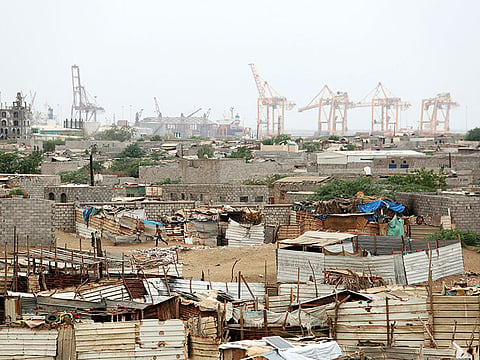UN envoy in talks over Hodeida handover
Coalition forces battle Al Houthis holed up in Hodeida airport

Cairo: UN Special envoy Martin Griffiths on Sunday met in the Yemeni capital Sana’a with leaders of Al Houthi militants in a fresh peace bid reportedly based on the Iran-allied militias’ safe withdrawal from the embattled coastal city of Hodeida.
Hodeida in western Yemen is the focus of a massive offensive launched last week by government forces supported by a Saudi-led coalition.
Griffiths is seeking to convince Al Houthis of peacefully handing over the Red Sea city and its vital port in return for initiating peace negotiations leading to their inclusion in a national unity government, Yemeni media reported.
The international mediator, who arrived in militant-controlled Sana’a on Saturday, seeks a meeting with militant leader Abdul Malak Al Houthi to discuss his proposals aimed at a peace deal, news portal Adan Al Ghad reported, citing sources close to the militant group.
Hodeida is strategically important because it has a harbour, which is a lifeline for millions of Yemenis, as most of the commercial imports and relief supplies enter through it to the country.
Al Houthis have been in control of Hodeida and Sana’a since their late 2014 coup against the internationally-recognised government.
The Arab Coalition accuses Al Houthis of taking advantage of their control of Hodeida port to obtain weapons from their Iranian patrons as well as confiscate aid intended for Yemenis in order to sustain their war efforts.
The United Arab Emirates (UAE), a leading partner to the Arab Coalition, has voiced backing for Griffiths’ current efforts.
UAE Minister of State for Foreign Affairs, Anwar Gargash, said his country and the coalition appreciate the UN envoy’s “tireless determination” to persuade Al Houthis to lay down their weapons and enter into “meaningful” political talks.
“We and all of Yemen would welcome good news out of Sana’a. We encourage the envoy’s efforts to facilitate the safe handover of Hodeida to the legitimate Yemeni Government,” Gargash said on his Twitter account.
“The people of Hodeida urgently want to be liberated. The coalition will continue with its military and humanitarian preparations to achieve this urgent result,” he added.
On Wednesday, Yemeni forces, backed by coalition air power, kicked off their offensive, dubbed “Golden Victory”, aimed at retaking Hodeida, a city of around 600,000 people, from Al Houthis.
Coalition-backed forces have since made swift territorial advances.
The city’s airport, around 10 kilometres from Hodeida harbour, is almost completely in their control.
On Sunday, government forces were engaged in fierce fighting against the militants holed up in the western side of the airport after they had seized large parts of the sprawling facility.
Coalition jets also mounted air strikes against militants, who are still inside the airport, the Dubai-based television Al Arabiya reported.
The Yemeni army said that its forces were combing the airport for remaining militants.
The full securing of the facility is expected to take time due to mines Al Houthis have planted to hamper the forces’ progress, field sources said.
The takeover of the airport clears the way for the government forces to head towards the harbour and the centre of Hodeida.
Hodeida lies 230 kilometres from Sana’a, which Al Houthis seized in a coup in 2014.
This prompted a Saudi-led intervention in Yemen the following year, aimed at restoring the internationally-recognised government of exiled President Abd Rabbo Mansour Hadi.
The coalition accuses Al Houthis of using Hodeida as a launch pad for attacks on shipping in the Red Sea and for smuggling in weapons.
Al Houthis have in recent months ramped up missile attacks against neighbouring Saudi Arabia.
The Governor of Hodeida, Al Hassan Taher, has said that government troops have drawn up a plan to partially encircle the city.
“The army troops are advancing towards Hodeida and are working to encircle it from two directions: in the south and south-east with the aim of blocking any supplies to the [Al Houthi] militias from Sana’a and Taiz [in the south],” Taher told the London-based newspaper Al Sharq Al Awsat recently.
The UAE, Saudi Arabia’s main coalition ally, set up a force in early 2018 to ramp up the coastal offensive.
Why is Hodeida important?
The full recapture of the city will deprive the Iran-aligned militants from the only port that is still under their control and cut off their supply route from Sana’a and the south-western city of Taiz.
The Saudi-led Arab coalition has accused Iran of using the port to smuggle weapons to Al Houthis in order to sustain their war efforts.
Thousands of ballistic missiles made in Iran have been fired into Saudi Arabia, which Riyadh has dubbed ‘an act of war’.
Many observers believe the liberation of the port city will be a tipping point in the war.
Losing access to their main source of weapons, Al Houthis could be more open to a political settlement.
Past attempts at political talks have largely failed due to the militants’ refusal to compromise.
The militants have repeatedly threatened to attack oil tankers using Bab Al Mandab, a major waterway between the Arabian Peninsula and Africa, linking the Red Sea with the Gulf of Aden and the Suez Canal.
The current battle in Hodeida is the largest in Yemen’s three-year-old war.
In 2015, the Arab Coalition started a military campaign against Al Houthis after the militants moved on the southern city of Aden, the temporary seat of the government, after the militias had seized Sana’a.



